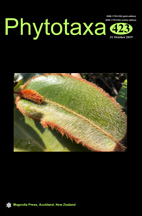Abstract
DNA sequence analysis of plastid-encoded psbA and rbcL loci, and nuclear-encoded LSU rDNA of rhodolith-forming specimens of Sporolithales from Brazil and the northwestern Gulf of Mexico reveal that they belong to an unnamed species of Sporolithon (Sporolithaceae). Sporolithon amadoi sp. nov. is morpho-anatomically characterized by a vegetative thallus reaching more than 20 cell layers, a tetrasporophyte with tetrasporangial sori slightly raised above the thallus surface that become overgrown and buried after spore release, and by cruciately divided tetrasporangia with pores surrounded by 9–13 rosette cells. Since these morpho-anatomical features are shared with some other Sporolithon species, identification of this species can only be confirmed by DNA sequences.

